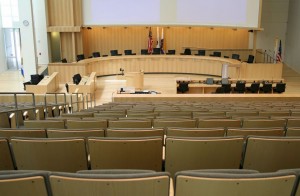Town Hall Prayers Continued: Just Not from On High

Today is the National Day of Prayer, a day on which government officials across the country will violate one of the foundational principles of our society and government—the separation between church and state. They will do this by participating in prayer ceremonies as representatives of the government and even by asking some of their constituents to pray through government actions.
This observance might make humanists feel as though the state of secularism in our country is on the decline, but thankfully a recent case involving two American Humanist Association members, who served as plaintiffs, may finally help turn the tide. Just this week, a US district court ruled against local government officials in Rowan County, North Carolina, who opened government meetings with sectarian prayer.
Prayer at local government meetings should sound familiar, as it was only recently that the Supreme Court decided in Town of Greece v. Galloway that prayer could be held at town meetings. However, according to SCOTUSblog, “the town’s practice of opening its town board meetings with a prayer offered by members of the clergy does not violate the Establishment Clause when the practice is consistent with the tradition long followed by Congress and state legislatures, the town does not discriminate against minority faiths in determining who may offer a prayer, and the prayer does not coerce participation with non-adherents.”
Essentially, the Supreme Court found that prayer is permissible when offered by local citizens (and the court later clarified that as many religious communities as possible should be allowed to participate) while the district court has held that prayer cannot be initiated by government officials at local meetings. According to the ruling by the district judge in this case, Judge James Beaty, “where the Commissioners themselves are the ones giving the prayer, they are by default acting as ‘supervisors’ of the prayers, and are themselves editing [and] approving prayers as they simultaneously deliver those prayers.” Clearly, to the judge this sort of behavior is unconstitutional and suggests government establishment of religion, or an unacceptable degree of government participation in religion and religious activities.
In a way, the situation created by this ruling, if upheld, is similar to the situation in our public schools, where private citizens (students) can participate in and initiate religious activity, but state employees (teachers, coaches, school administrators) are not permitted to initiate religious activity. That’s because we recognize the same thing that Judge Beatty did, that initiation of religious activity by a state employee is unacceptable and illegal because it is an attempt, however small, at the establishment of religion.
Some secularists and nonreligious Americans will likely still object to the idea of any prayer being offered at local government meetings, even if offered by private citizens, as they set a religious tenor for the overall meeting and waste valuable time that could be best spent attending to local problems. It’s even possible that one of the prayers being offered could use biblical language that is discriminatory towards marginalized communities, giving a sense of government approval to privately held bigotry.
The court’s decision in this case is a strong move in the effort of restoring secularism as the norm, but more can and should be done by the judiciary at both the state and federal level to ensure that local government meetings remain nonsectarian, and that nonreligious Americans don’t feel abandoned by overtly religious government officials.
